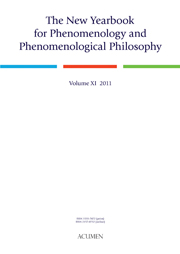Book contents
- Frontmatter
- Contents
- Articles
- Husserl and the Mind–Body Problem
- Phenomenological Kaleidoscope: Remarks on the Husserlian Method of Eidetic Variation
- Husserl and McDowell on the Role of Concepts in Perception
- Edmund Husserl's Europe: Borders, Limits and Crises
- The Ontological Status of Essences in Husserl's Thought
- Heidegger on Understanding One's Own Being
- Discussion
- In Review
- Conclusion
The Ontological Status of Essences in Husserl's Thought
from Articles
- Frontmatter
- Contents
- Articles
- Husserl and the Mind–Body Problem
- Phenomenological Kaleidoscope: Remarks on the Husserlian Method of Eidetic Variation
- Husserl and McDowell on the Role of Concepts in Perception
- Edmund Husserl's Europe: Borders, Limits and Crises
- The Ontological Status of Essences in Husserl's Thought
- Heidegger on Understanding One's Own Being
- Discussion
- In Review
- Conclusion
Summary
Abstract: Phenomenology has been defined by Husserl as “theory of the essences of pure phenomena,” yet the ontological status of essences in Husserlian phenomenology is far from a settled issue. The late Husserlian emphasis on genetic constitution and the historicity of the lifeworld is not immediately reconcilable with the ‘unchangeable’ nature that is prima facie attributed to essences. However, the problem of the nature of ideality cannot be dropped from phenomenological accounts without jeopardizing the phenomenological enterprise as such. Through an immanent analysis of Husserl's meditation on essences a positive account of their ontological status is provided. Essences are interpreted as ontological thresholds, primordially rooted in our motivated confrontation with sensuous transcendence. Essences appear as emergent ontological features, which are not reducible to their particular realizations and which exhibit a fundamental continuity between consciousness and being. They manifest themselves as prospectively a priori (a precondition for further experiences), but retrospectively a posteriori (they are founded in experience). Finally, essences manifest the ‘co-essential’ nature of consciousness and sensuous transcendence: they are the way in which we are motivated and constitutively bound to articulate being, which in turn is apt to be thus articulated.
Keywords: Edmund Husserl; essences; phenomenology and ontology; emergent qualities
Phenomenology has been consistently defined over time by Husserl as “theory of the essences (Wesenslehre) of pure phenomena,” and, indeed, the notion of ‘essence’ (in its various verbal realizations as Wesen, Essenz, Eidos, Idee, Idealität, etc.) lies at the core of the phenomenological project; yet, to establish the ontological status of essences in Husserlian phenomenology is neither an easy nor an uncontroversial task.
- Type
- Chapter
- Information
- The New Yearbook for Phenomenology and Phenomenological PhilosophyVolume XI 2011, pp. 96 - 127Publisher: Acumen PublishingPrint publication year: 2012



